新概念英语第二册笔记_第90课
新概念英语第二册90课课后习题详细答案
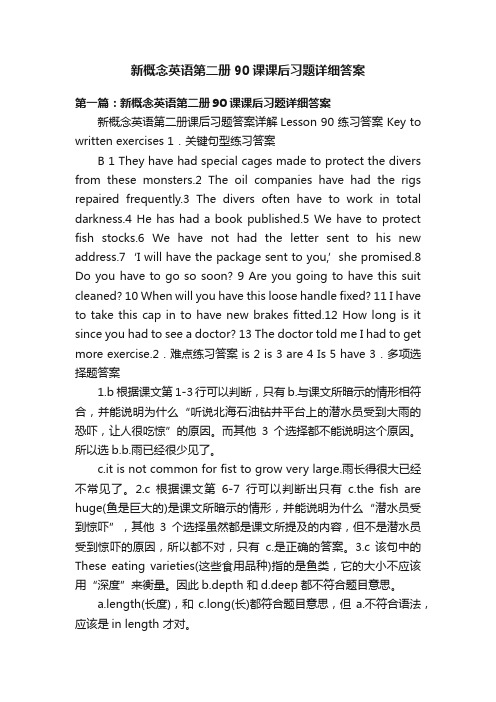
新概念英语第二册90课课后习题详细答案第一篇:新概念英语第二册90课课后习题详细答案新概念英语第二册课后习题答案详解Lesson 90 练习答案 Key to written exercises 1.关键句型练习答案B 1 They have had special cages made to protect the divers from these monsters.2 The oil companies have had the rigs repaired frequently.3 The divers often have to work in total darkness.4 He has had a book published.5 We have to protect fish stocks.6 We have not had the letter sent to his new address.7‘I will have the package sent to you,’she promised.8 Do you have to go so soon? 9 Are you going to have this suit cleaned? 10 When will you have this loose handle fixed? 11 I have to take this cap in to have new brakes fitted.12 How long is it since you had to see a doctor? 13 The doctor told me I had to get more exercise.2.难点练习答案 is 2 is 3 are 4 Is 5 have 3.多项选择题答案1.b 根据课文第1-3行可以判断,只有b.与课文所暗示的情形相符合,并能说明为什么“听说北海石油钻井平台上的潜水员受到大雨的恐吓,让人很吃惊”的原因。
新概念英语第二册90课课后习题详细答案
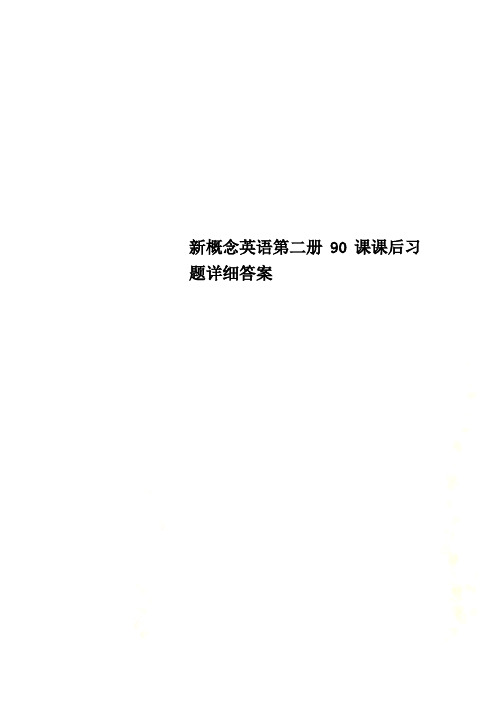
新概念英语第二册90课课后习题详细答案新概念英语第二册课后习题答案详解Lesson 90练习答案Key to written exercises1.关键句型练习答案B 1 They have had special cages made to protect the divers from these monsters.2 The oil companies have had the rigs repaired frequently.3 The divers often have to work in total darkness.4 He has had a book published.5 We have to protect fish stocks.6 We have not had the letter sent to his new address.7‘I will have the package sent to you,’she promised.8 Do you have to go so soon?9 Are you going to have this suit cleaned?10 When will you have this loose handle fixed?11 I have to take this cap in to have new brakes fitted.12 How long is it since you had to seea doctor?13 The doctor told me I had to get more exercise.2.难点练习答案1 is2 is3 are4 Is5 have3.多项选择题答案1. b根据课文第1-3行可以判断,只有b.与课文所暗示的情形相符合,并能说明为什么“听说北海石油钻井平台上的潜水员受到大雨的恐吓,让人很吃惊”的原因。
(最新版)新概念英语第二册 Lesson 90---What's-for-supper
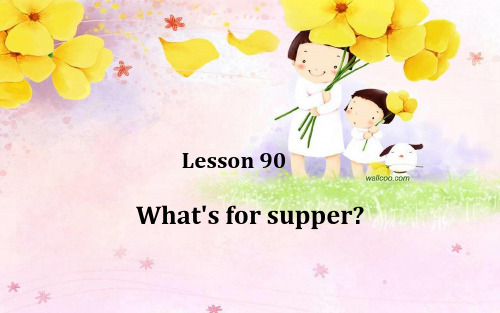
• • • •
我把饭做糊了。 I overcook the rice. 你过分了。 You overdid it.
giant • (1) adj. 巨大的 • 一个大公司 • a giant corporation • (2)n. (故事或传说等)巨人 • 杰克看到巨人爬下豆茎。 • Jack saw the giant climbing down the beanstalk
diver n. 潜水员、跳水选手 • dive into (突然)投入, 跳入、潜心研究 • 他曾潜心电脑游戏。 • He dived into the computer games .
oil • (1) n. 油 • 食用油 • cooking oil • pour oil on the flame • (2) n. 油画颜料 • 画油画 • paint in oils • (3) v. 在…….注 (涂)油 • 给钟加油 • oil a clock
wit cage shark whale variety cod skate factor crew
• • • • • • • • •
n. (复数) 理智,头脑 n. 笼 n. 鲨鱼 n. 鲸 n. 品种 n. 鳕 n. 鳐 n. 因素 n. 全体工作人员
overfish
v. 过度捕捞
• over 做前缀,“过度的”打扮的过了份 • overdressed
giant • (3) n. 伟人、大人物 • 他是电子行业的大人物 • He is the giant in the field of electronics.
• • • • • • •
Hale Waihona Puke terrify v. 吓,使恐怖、使受惊吓 terrify sb 惊吓某人、威胁(某人) 他的突然出现,吓坏了他们。 His sudden appearance terrified them. be terrified by / be terrified at 被……吓一跳 他的突然出现使他们都吓坏了。 They were terrified by/ at his sudden appearance.
新概念第二册课文翻译及学习笔记【Lesson88、89、90】
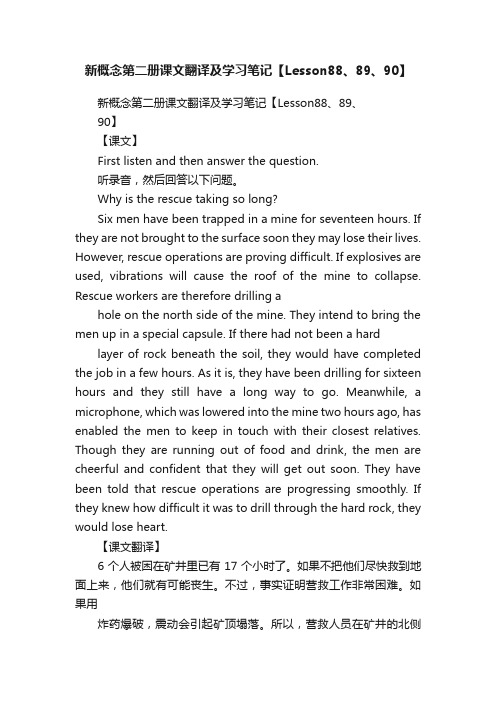
新概念第二册课文翻译及学习笔记【Lesson88、89、90】新概念第二册课文翻译及学习笔记【Lesson88、89、90】【课文】First listen and then answer the question.听录音,然后回答以下问题。
Why is the rescue taking so long?Six men have been trapped in a mine for seventeen hours. If they are not brought to the surface soon they may lose their lives. However, rescue operations are proving difficult. If explosives are used, vibrations will cause the roof of the mine to collapse. Rescue workers are therefore drilling ahole on the north side of the mine. They intend to bring the men up in a special capsule. If there had not been a hard layer of rock beneath the soil, they would have completed the job in a few hours. As it is, they have been drilling for sixteen hours and they still have a long way to go. Meanwhile, a microphone, which was lowered into the mine two hours ago, has enabled the men to keep in touch with their closest relatives. Though they are running out of food and drink, the men are cheerful and confident that they will get out soon. They have been told that rescue operations are progressing smoothly. If they knew how difficult it was to drill through the hard rock, they would lose heart.【课文翻译】6个人被困在矿井里已有17个小时了。
新概念二英语90课原文及译文
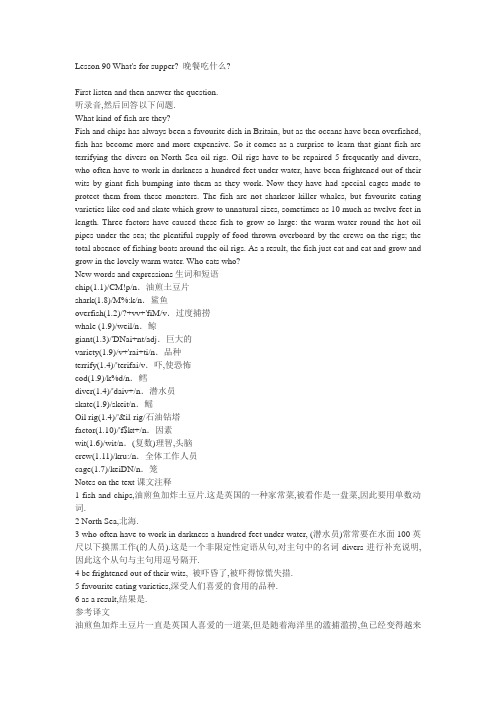
Lesson 90 What's for supper? 晚餐吃什么?First listen and then answer the question.听录音,然后回答以下问题.What kind of fish are they?Fish and chips has always been a favourite dish in Britain, but as the oceans have been overfished, fish has become more and more expensive. So it comes as a surprise to learn that giant fish are terrifying the divers on North Sea oil rigs. Oil rigs have to be repaired 5 frequently and divers, who often have to work in darkness a hundred feet under water, have been frightened out of their wits by giant fish bumping into them as they work. Now they have had special cages made to protect them from these monsters. The fish are not sharksor killer whales, but favourite eating varieties like cod and skate which grow to unnatural sizes, sometimes as 10 much as twelve feet in length. Three factors have caused these fish to grow so large: the warm water round the hot oil pipes under the sea; the plentiful supply of food thrown overboard by the crews on the rigs; the total absence of fishing boats around the oil rigs. As a result, the fish just eat and eat and grow and grow in the lovely warm water. Who eats who?New words and expressions生词和短语chip(1.1)/CM!p/n.油煎土豆片shark(1.8)/M%:k/n.鲨鱼overfish(1.2)/?+vv+'fiM/v.过度捕捞whale (1.9)/weil/n.鲸giant(1.3)/'DNai+nt/adj.巨大的variety(1.9)/v+'rai+ti/n.品种terrify(1.4)/'terifai/v.吓,使恐怖cod(1.9)/k%d/n.鳕diver(1.4)/'daiv+/n.潜水员skate(1.9)/skeit/n.鳐Oil rig(1.4)/'&il-rig/石油钻塔factor(1.10)/'f$kt+/n.因素wit(1.6)/wit/n.(复数)理智,头脑crew(1.11)/kru:/n.全体工作人员cage(1.7)/keiDN/n.笼Notes on the text课文注释1 fish and chips,油煎鱼加炸土豆片.这是英国的一种家常菜,被看作是一盘菜,因此要用单数动词.2 North Sea,北海.3 who often have to work in darkness a hundred feet under water, (潜水员)常常要在水面100英尺以下摸黑工作(的人员).这是一个非限定性定语从句,对主句中的名词divers进行补充说明,因此这个从句与主句用逗号隔开.4 be frightened out of their wits, 被吓昏了,被吓得惊慌失措.5 favourite eating varieties,深受人们喜爱的食用的品种.6 as a result,结果是.参考译文油煎鱼加炸土豆片一直是英国人喜爱的一道菜,但是随着海洋里的滥捕滥捞,鱼已经变得越来越昂贵.因此,听说北海石油钻井平台上的潜水员受到巨型鱼类的恐吓,确实很让人吃惊.钻井平台需要经常修理,潜水员常常要在水面100英尺以下摸黑工作,他们曾在工作时被撞到他们身上的大鱼吓得惊慌失措.现在他们有了特制的笼子,用来保护他们免受大鱼的侵袭.这些鱼并不是鲨鱼或逆戟鲸,而是深受人们喜爱的食用鱼品种;如鳕鱼和鳐鱼,只不过它们长得出奇地大,有时长达12英尺.这些鱼能长得这么大是由3个因素造成的:海底热的输油管道附近的温暖的海水;钻井平台工作人员抛到海里充足的食物;钻井平台周围根本没有捕鱼船只.结果是,这些鱼就在可爱的温暖的水流中吃呀吃,长呀长.究竟谁吃谁呢?。
新概念英语第二册课后答案详解:第90课
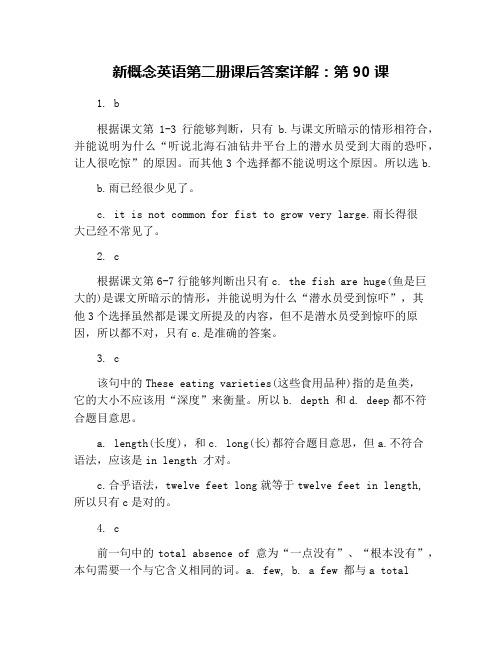
新概念英语第二册课后答案详解:第90课1. b根据课文第1-3行能够判断,只有b.与课文所暗示的情形相符合,并能说明为什么“听说北海石油钻井平台上的潜水员受到大雨的恐吓,让人很吃惊”的原因。
而其他3个选择都不能说明这个原因。
所以选b.b.雨已经很少见了。
c. it is not common for fist to grow very large.雨长得很大已经不常见了。
2. c根据课文第6-7行能够判断出只有c. the fish are huge(鱼是巨大的)是课文所暗示的情形,并能说明为什么“潜水员受到惊吓”,其他3个选择虽然都是课文所提及的内容,但不是潜水员受到惊吓的原因,所以都不对,只有c.是准确的答案。
3. c该句中的These eating varieties(这些食用品种)指的是鱼类,它的大小不应该用“深度”来衡量。
所以b. depth 和d. deep都不符合题目意思。
a. length(长度),和c. long(长)都符合题目意思,但a.不符合语法,应该是in length 才对。
c.合乎语法,twelve feet long就等于twelve feet in length,所以只有c是对的。
4. c前一句中的total absence of 意为“一点没有”、“根本没有”,本句需要一个与它含义相同的词。
a. few, b. a few 都与a totalabsence of 含义不符合,所以不对。
c. no , d. not 都是不,没有的意思,与a total absence of 含义相同,not 不合乎语法,应该是not any 才准确,所以选c.5. a只有选a. ought to be 才符合语法,并与前一句含义相符合。
其他都不符合语法,所以选a.6. b本句需要一个合适的介词。
a. as 能够作介词,意思为“作为,如同”;b. like 能够做介词,意思为“像,如”;c. similar 是形容词,意思为“相像的,类似的”;d. resemble(像,类似)是动词;c.d.都不是介词,不符合题目意思;a.和b.都是介词,但b.比a更符合题目意思,只有选b. like这个句子意思才更通顺,所以b.是答案。
新概念英语第二册90课课后习题详细答案
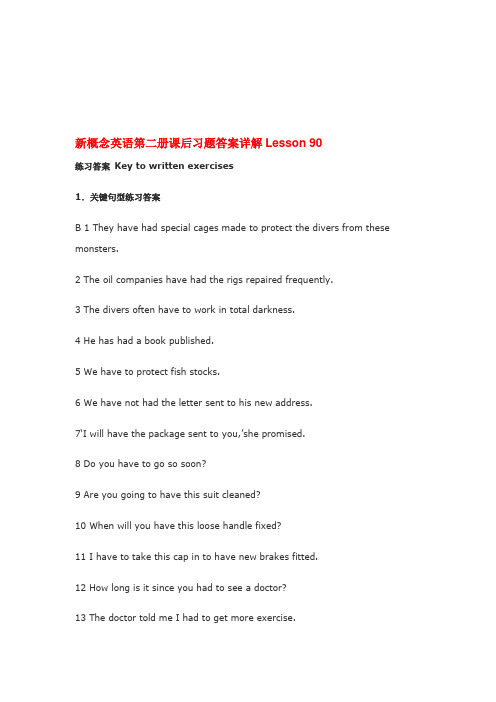
新概念英语第二册课后习题答案详解Lesson 90练习答案Key to written exercises1.关键句型练习答案B 1 They have had special cages made to protect the divers from these monsters.2 The oil companies have had the rigs repaired frequently.3 The divers often have to work in total darkness.4 He has had a book published.5 We have to protect fish stocks.6 We have not had the letter sent to his new address.7‘I will have the package sent to you,’she promised.8 Do you have to go so soon?9 Are you going to have this suit cleaned?10 When will you have this loose handle fixed?11 I have to take this cap in to have new brakes fitted.12 How long is it since you had to see a doctor?13 The doctor told me I had to get more exercise.2.难点练习答案1 is2 is3 are4 Is5 have3.多项选择题答案1. b根据课文第1-3行可以判断,只有b.与课文所暗示的情形相符合,并能说明为什么“听说北海石油钻井平台上的潜水员受到大雨的恐吓,让人很吃惊”的原因。
而其他3个选择都不能说明这个原因。
《新概念英语》第二册学习笔记90 89课
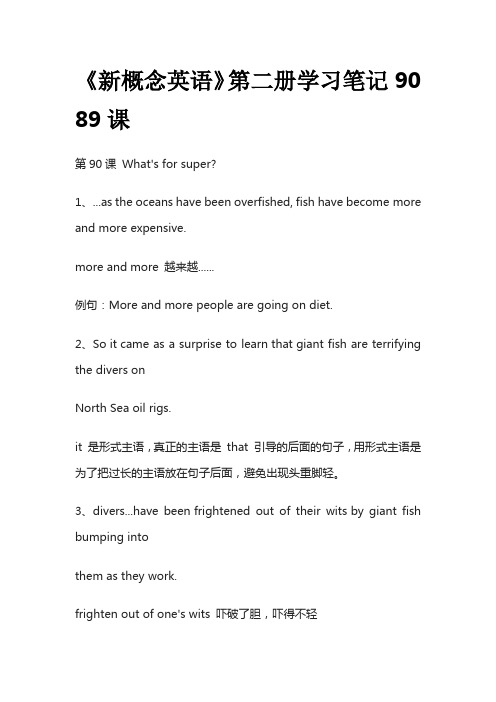
《新概念英语》第二册学习笔记90 89课第90课What's for super?1、...as the oceans have been overfished, fish have become more and more expensive.more and more 越来越......例句:More and more people are going on diet.2、So it came as a surprise to learn that giant fish are terrifying the divers onNorth Sea oil rigs.it 是形式主语,真正的主语是that 引导的后面的句子,用形式主语是为了把过长的主语放在句子后面,避免出现头重脚轻。
3、divers...have been frightened out of their wits by giant fish bumping intothem as they work.frighten out of one's wits 吓破了胆,吓得不轻例句:A car passed me at top speed, sounding its horn, frightening me out of my wits.4、Now they have had special cages made to protect them from these monsters.have sth. done 让某人替自己做某事例句:He's going to have his car repaired.protect sb. from sth. 保护某人不受伤害例句:She had an old umbrella to protect her from the rain.5、have 的用法:(1)Fish and chips has always been a favourite dish in Britain...此句中的has 是助动词,帮助构成现在完成时。
新概念第二册第九十课 逐句翻译及语法点
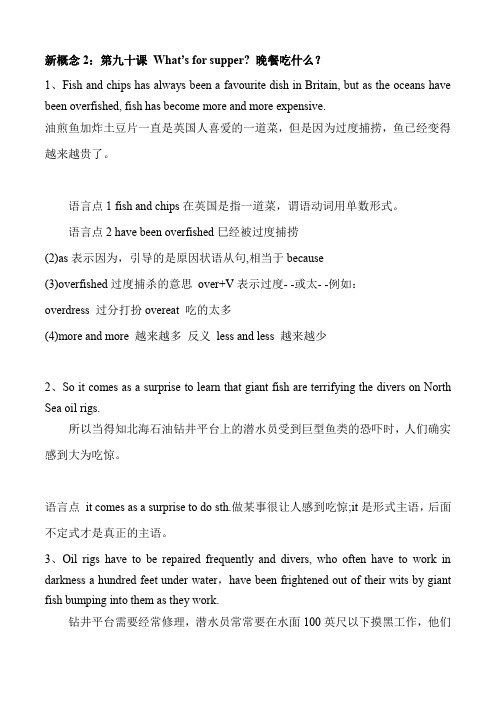
新概念2:第九十课What’s for supper? 晚餐吃什么?1、Fish and chips has always been a favourite dish in Britain, but as the oceans have been overfished, fish has become more and more expensive.油煎鱼加炸土豆片一直是英国人喜爱的一道菜,但是因为过度捕捞,鱼已经变得越来越贵了。
语言点1 fish and chips在英国是指一道菜,谓语动词用单数形式。
语言点2 have been overfished巳经被过度捕捞(2)as表示因为,引导的是原因状语从句,相当于because(3)overfished过度捕杀的意思over+V表示过度--或太--例如:overdress 过分打扮overeat 吃的太多(4)more and more 越来越多反义less and less 越来越少2、So it comes as a surprise to learn that giant fish are terrifying the divers on North Sea oil rigs.所以当得知北海石油钻井平台上的潜水员受到巨型鱼类的恐吓时,人们确实感到大为吃惊。
语言点it comes as a surprise to do sth.做某事很让人感到吃惊;it是形式主语,后面不定式才是真正的主语。
3、Oil rigs have to be repaired frequently and divers, who often have to work in darkness a hundred feet under water,have been frightened out of their wits by giant fish bumping into them as they work.钻井平台需要经常修理,潜水员常常要在水面100英尺以下摸黑工作,他们曾在工作时被撞到他们身上的大鱼吓得惊慌失措。
新概念英语第二册:第90课课文详解及语法解析
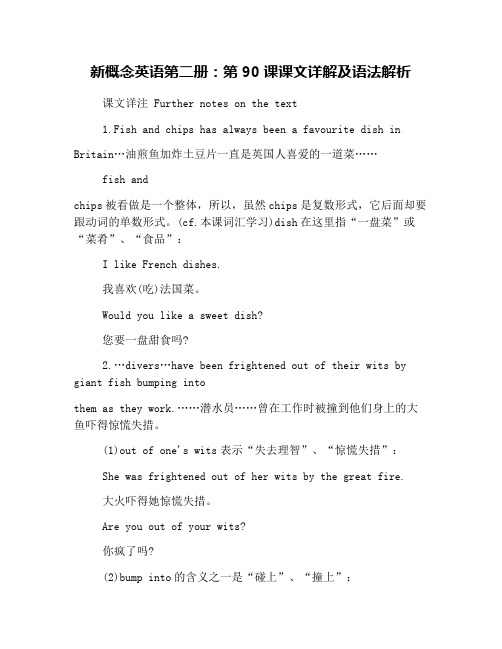
新概念英语第二册:第90课课文详解及语法解析课文详注 Further notes on the text1.Fish and chips has always been a favourite dish inBritain…油煎鱼加炸土豆片一直是英国人喜爱的一道菜……fish andchips被看做是一个整体,所以,虽然chips是复数形式,它后面却要跟动词的单数形式。
(cf.本课词汇学习)dish在这里指“一盘菜”或“菜肴”、“食品”:I like French dishes.我喜欢(吃)法国菜。
Would you like a sweet dish?您要一盘甜食吗?2.…divers…have been frightened out of their wits by giant fish bumping intothem as they work.……潜水员……曾在工作时被撞到他们身上的大鱼吓得惊慌失措。
(1)out of one's wits表示“失去理智”、“惊慌失措”:She was frightened out of her wits by the great fire.大火吓得她惊慌失措。
Are you out of your wits?你疯了吗?(2)bump into的含义之一是“碰上”、“撞上”:Wandering in darkness, the drunk bumped into a policeman.那醉汉在黑夜中闲荡时撞到了一个警察的身上。
bump into也能够表示“偶然遇见”、“碰见”(多用于口语):I bumped into Jane at the conference.我开会时碰见了简。
(3)as在这里相当于when或while。
3.Now they have had special cages made to protect them from these monsters.现在他们有了特制的笼子,用来保护他们免受大鱼的侵袭。
新概念英语第二册Lesson90 What’s for supper
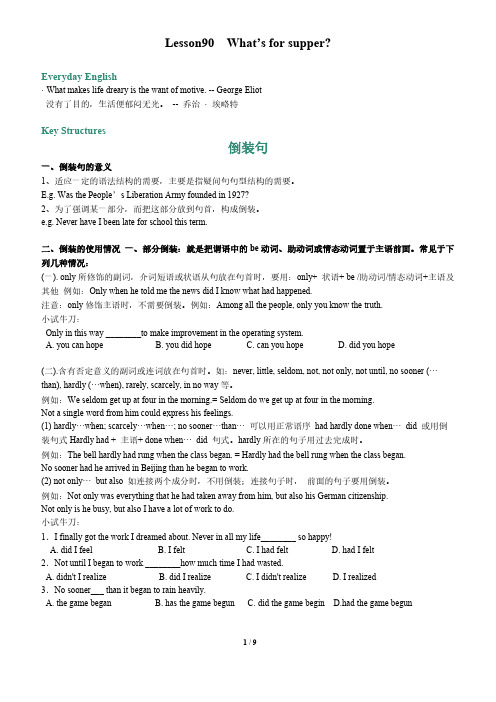
Lesson90 What’s for supper?Everyday English· What makes life dreary is the want of motive. -- George Eliot没有了目的,生活便郁闷无光。
-- 乔治·埃略特Key Structures倒装句一、倒装句的意义1、适应一定的语法结构的需要,主要是指疑问句句型结构的需要。
E.g. Was the People’s Liberation Army founded in 1927?2、为了强调某一部分,而把这部分放到句首,构成倒装。
e.g. Never have I been late for school this term.二、倒装的使用情况一、部分倒装:就是把谓语中的be动词、助动词或情态动词置于主语前面。
常见于下列几种情况:(一). only所修饰的副词,介词短语或状语从句放在句首时,要用:only+ 状语+ be /助动词/情态动词+主语及其他例如:Only when he told me the news did I know what had happened.注意:only修饰主语时,不需要倒装。
例如:Among all the people, only you know the truth.小试牛刀:Only in this way ________to make improvement in the operating system.A. you can hopeB. you did hopeC. can you hopeD. did you hope(二).含有否定意义的副词或连词放在句首时。
如:never, little, seldom, not, not only, not until, no sooner (…than), hardly (…when), rarely, scarcely, in no way等。
新概念英语第二册90课
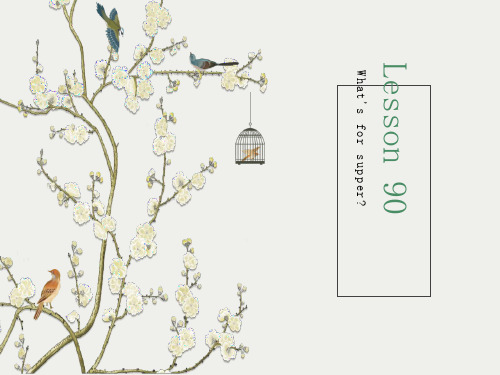
他潛心研究中國的歷史。
He dived into the history of China .
oil
n. 油
食用油
cooking oil
pour oil on the flame
n. 油畫顏料
画油画
paint in oils
v. 在…….注 (塗)油
給鐘加油
oil a clock
wit
diver n. 潜小员、跳水選手
dive n./ vi.跳水,潛水;俯沖,撲
從橋上跳入河中
dive from the bridge into the river
dive for (為尋找或取……) 潛水
他們潛水去撈牡蠣
They dived down for oysters .
dive into (突然)投入, 跳入、潛心研究
the warm water round the hot oil pipes under the sea; the plentiful supply of food thrown overboard by the crews on the rigs; overboard adv.(自船上、岸上) 到水中 fall overboard 從船上落水、 從火車上掉下來 plentiful adj. 豐富的、很多的(反義詞 scarce) 水供應充足 a plentiful supply of water plenty n. plenty of 大量的 通常用於肯定句中 否定句、疑問句則用 enough , much , many
n.(造成某結果的) 因素、要素
Money is the main factor that caused the dispute.
新概念第二册lesson90Whatsforsupper
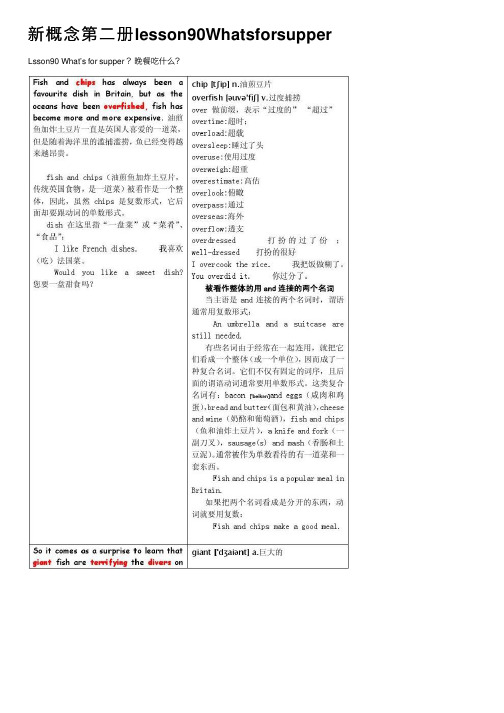
新概念第⼆册lesson90Whatsforsupper Lsson90 What’s for supper ?晚餐吃什么?1 chip [t?ip] n.油煎⾖⽚_____________________________________________________2 overfish [?uv?'fi?] v.过度捕捞_____________________________________________3 giant ['d?ai?nt] a.巨⼤的___________________________________________________4 terrify ['terifai] v.吓,使恐怖_________________________________________________5 diver ['daiv?] n.潜⽔员______________________________________________________6 oil rig ['?il ?rig] ⽯油钻塔______________________________________________________7 wit[wit] n.(复数)理智,头脑__________________________________________________8 cage [keid?] n.笼______________________________________________________9 shark [?ɑ:k] n.鲨鱼______________________________________________________10 whale [weil] n.鲸______________________________________________________11 variety[v?'rai?ti] n.品种______________________________________________________12 cod [k?d] n.鳕______________________________________________________13 skate [skeit] n.鳐______________________________________________________14 factor ['f?kt?] n.因素______________________________________________________15 crew [kru:] n.全体⼯作⼈员___________________________________________________1 n.油煎⾖⽚_____________________________________________________2 v.过度捕捞_____________________________________________3 a.巨⼤的___________________________________________________4 v.吓,使恐怖_________________________________________________5 n.潜⽔员______________________________________________________6 ⽯油钻塔______________________________________________________7 n.(复数)理智,头脑__________________________________________________ 8n.笼______________________________________________________9n.鲨鱼______________________________________________________10n.鲸______________________________________________________11 n.品种______________________________________________________12 n.鳕______________________________________________________13 n.鳐______________________________________________________14n.因素______________________________________________________15 n.全体⼯作⼈员___________________________________________________ overdressed 打扮的过了份well-dressed 打扮的很好bacon ['beik?n]and eggs(咸⾁和鸡蛋)bread and butter(⾯包和黄油)cheese and wine(奶酪和葡萄酒)fish and chips(鱼和油炸⼟⾖⽚):可以看作是单数也可以看作是两种不同的东西a knife and fork(⼀副⼑叉)sausage(s) and mash(⾹肠和⼟⾖泥)fear/be afraid of 害怕……(主语是⼈)out of one's wits “失去理智”,”惊惶失措”beat sb. to mummy 打个半死,失去理智,惊慌失措bump into :①碰上,撞上②偶然遇见,碰见(多⽤于⼝语)variety show 综艺节⽬various = all kinds of adj. 各种各样的grow to 长到as much as 像……⼀样(最⼤限度)+ 数字absence of 缺少,不存在total absence of…完全没有……total absence of mind ⼼不在焉the total absence of order… 没有秩序as a result = so 结果是,因此as a result of = because of因为……;作为......的结果。
(完整word版)新概念第二册lesson90Whatsforsupper
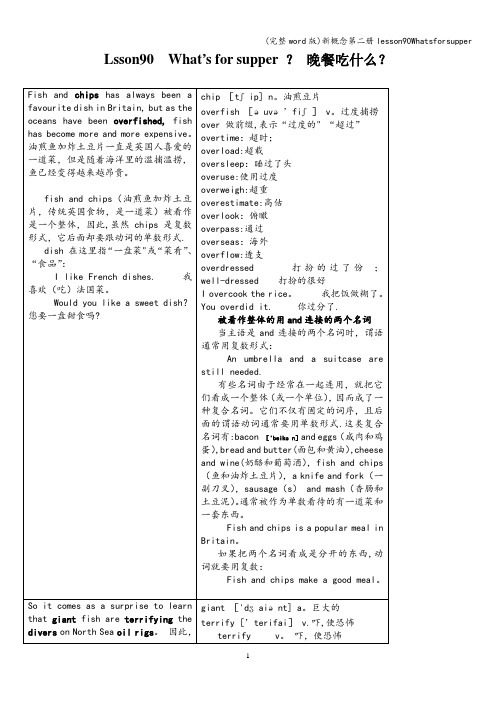
Lsson90 What’s for supper ?晚餐吃什么?1 chip [tʃip] n.油煎豆片_____________________________________________________2 overfish [əuvə'fiʃ] v。
过度捕捞_____________________________________________3 giant ['dʒaiənt] a.巨大的___________________________________________________4 terrify [’terifai] v。
吓,使恐怖_________________________________________________5 diver [’daivə] n.潜水员______________________________________________________6 oil rig [’ɔil ˌrig] 石油钻塔______________________________________________________7 wit[wit] n。
(复数)理智,头脑__________________________________________________8 cage [keidʒ] n.笼______________________________________________________9 shark [ʃɑ:k] n。
鲨鱼______________________________________________________10 whale [weil] n。
鲸______________________________________________________11 variety[və’raiəti] n.品种______________________________________________________12 cod [kɔd] n。
裕兴新概念英语第二册笔记 第90课
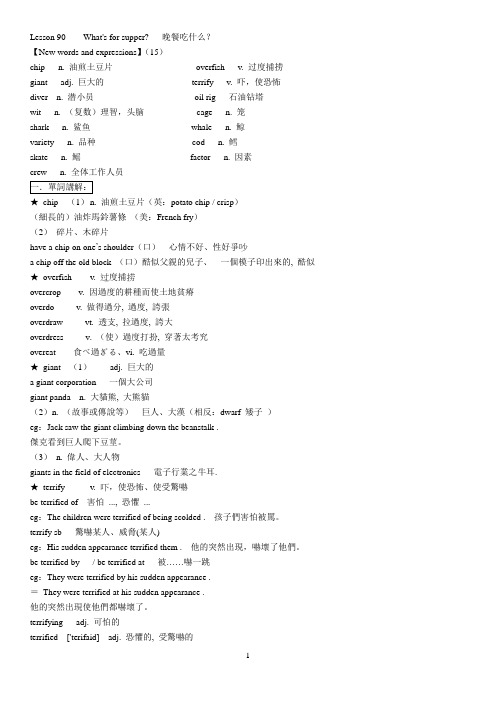
Lesson 90 What's for supper? 晚餐吃什么?【New words and expressions】(15)chip n. 油煎土豆片overfish v. 过度捕捞giant adj. 巨大的terrify v. 吓,使恐怖diver n. 潜小员oil rig 石油钻塔wit n. (复数)理智,头脑cage n. 笼shark n. 鲨鱼whale n. 鲸variety n. 品种cod n. 鳕skate n. 鳐factor n. 因素crew n. 全体工作人员★chip (1) n. 油煎土豆片(英:potato chip / crisp)(細長的)油炸馬鈴薯條(美:French fry)(2)碎片、木碎片have a chip on one’s shoulder(口)心情不好、性好爭吵a chip off the old block (口)酷似父親的兒子、一個模子印出來的, 酷似★overfish v. 过度捕捞overcrop v. 因過度的耕種而使土地貧瘠overdo v. 做得過分, 過度, 誇張overdraw vt. 透支, 拉過度, 誇大overdress v. (使)過度打扮, 穿著太考究overeat 食べ過ぎる、vi. 吃過量★giant (1)adj. 巨大的a giant corporation 一個大公司giant panda n. 大貓熊, 大熊貓(2)n. (故事或傳說等)巨人、大漢(相反:dwarf 矮子)eg:Jack saw the giant climbing down the beanstalk .傑克看到巨人爬下豆莖。
(3)n. 偉人、大人物giants in the field of electronics 電子行業之牛耳.★terrify v. 吓,使恐怖、使受驚嚇be terrified of 害怕..., 恐懼...eg:The children were terrified of being scolded . 孩子們害怕被罵。
新概念英语第二册学习笔记Lesson88~90
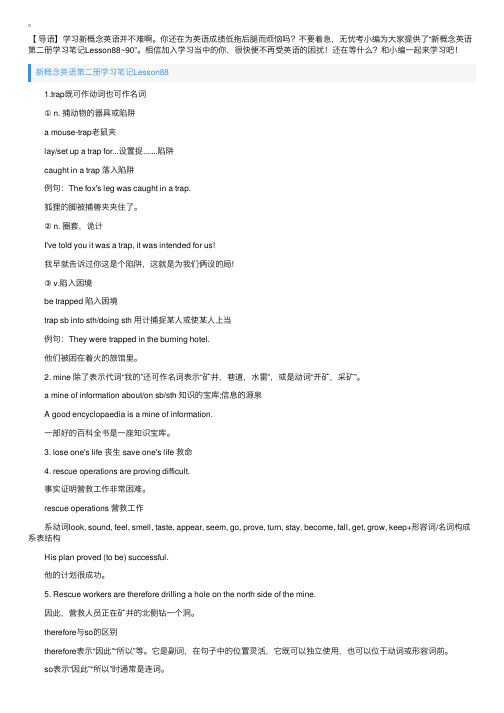
【导语】学习新概念英语并不难啊。
你还在为英语成绩低拖后腿⽽烦恼吗?不要着急,⽆忧考⼩编为⼤家提供了“新概念英语第⼆册学习笔记Lesson88~90”。
相信加⼊学习当中的你,很快便不再受英语的困扰!还在等什么?和⼩编⼀起来学习吧!新概念英语第⼆册学习笔记Lesson88 1.trap既可作动词也可作名词 ① n. 捕动物的器具或陷阱 a mouse-trap⽼⿏夹 lay/set up a trap for...设置捉.......陷阱 caught in a trap 落⼊陷阱 例句:The fox's leg was caught in a trap. 狐狸的脚被捕兽夹夹住了。
② n. 圈套,诡计 I've told you it was a trap, it was intended for us! 我早就告诉过你这是个陷阱,这就是为我们俩设的局! ③ v.陷⼊困境 be trapped 陷⼊困境 trap sb into sth/doing sth ⽤计捕捉某⼈或使某⼈上当 例句:They were trapped in the burning hotel. 他们被困在着⽕的旅馆⾥。
2. mine 除了表⽰代词“我的”还可作名词表⽰“矿井,巷道,⽔雷”,或是动词“开矿,采矿”。
a mine of information about/on sb/sth 知识的宝库;信息的源泉 A good encyclopaedia is a mine of information. ⼀部好的百科全书是⼀座知识宝库。
3. lose one's life 丧⽣ save one's life 救命 4. rescue operations are proving difficult. 事实证明营救⼯作⾮常困难。
rescue operations 营救⼯作 系动词look, sound, feel, smell, taste, appear, seem, go, prove, turn, stay, become, fall, get, grow, keep+形容词/名词构成系表结构 His plan proved (to be) successful. 他的计划很成功。
新概念英语第二册笔记-第90课
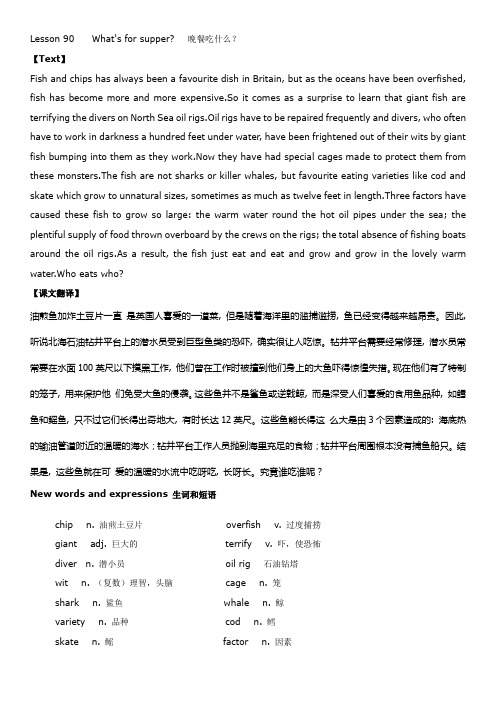
Lesson 90 What's for supper? 晚餐吃什么?【Text】Fish and chips has always been a favourite dish in Britain, but as the oceans have been overfished, fish has become more and more expensive.So it comes as a surprise to learn that giant fish are terrifying the divers on North Sea oil rigs.Oil rigs have to be repaired frequently and divers, who often have to work in darkness a hundred feet under water, have been frightened out of their wits by giant fish bumping into them as they work.Now they have had special cages made to protect them from these monsters.The fish are not sharks or killer whales, but favourite eating varieties like cod and skate which grow to unnatural sizes, sometimes as much as twelve feet in length.Three factors have caused these fish to grow so large: the warm water round the hot oil pipes under the sea; the plentiful supply of food thrown overboard by the crews on the rigs; the total absence of fishing boats around the oil rigs.As a result, the fish just eat and eat and grow and grow in the lovely warm water.Who eats who?【课文翻译】油煎鱼加炸土豆片一直是英国人喜爱的一道菜, 但是随着海洋里的滥捕滥捞, 鱼已经变得越来越昂贵。
新概念英语单词第二册第90课:晚餐吃什么
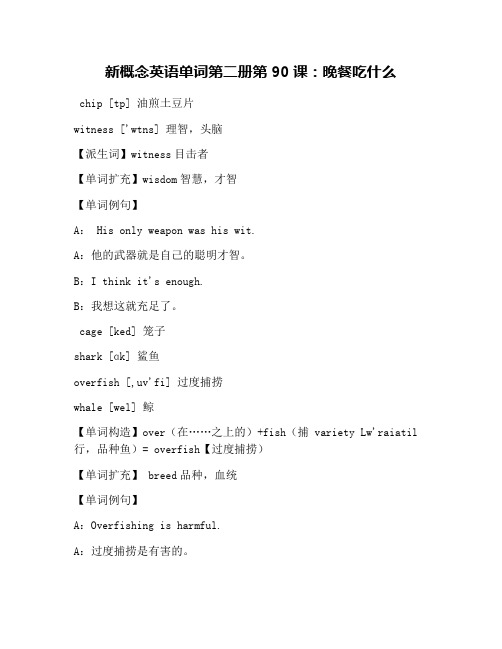
新概念英语单词第二册第90课:晚餐吃什么chip [tp] 油煎土豆片witness ['wtns] 理智,头脑【派生词】witness目击者【单词扩充】wisdom智慧,才智【单词例句】A: His only weapon was his wit.A:他的武器就是自己的聪明才智。
B:I think it's enough.B:我想这就充足了。
cage [ked] 笼子shark [ɑk] 鲨鱼overfish [,uv'fi] 过度捕捞whale [wel] 鲸【单词构造】over(在……之上的)+fish(捕 variety Lw'raiatil 行,品种鱼)= overfish【过度捕捞)【单词扩充】 breed品种,血统【单词例句】A:Overfishing is harmful.A:过度捕捞是有害的。
B: Yes, but some Japanese companies don't care about that at all.B:是的,但有些日本公司根本不关心。
giant ['dant] adj.巨大的terrify ['terfa] v吓,使恐怖【单词扩充】terrorize令人恐怖【单词例句】A: How dO you like the performance?A:你觉得演出怎么样?B: It nearly terrifies me out ofmy witsB:它差点把我吓死。
diver ['dav] 潜水员oil [l] 石油钻塔【单词例句】A:ls there any way I could get thinner lenses for my glasses?A:我的眼镜能配薄一点的镜片吗?B: Yes, you can have the lenses made with a variety of materials here. Some of them are very thin.B:能够啊,这里有各种材质的镜片,有些非常薄。
- 1、下载文档前请自行甄别文档内容的完整性,平台不提供额外的编辑、内容补充、找答案等附加服务。
- 2、"仅部分预览"的文档,不可在线预览部分如存在完整性等问题,可反馈申请退款(可完整预览的文档不适用该条件!)。
- 3、如文档侵犯您的权益,请联系客服反馈,我们会尽快为您处理(人工客服工作时间:9:00-18:30)。
Lesson 90 What's for supper? 晚餐吃什么?【Text】Fish and chips has always been a favourite dish in Britain, but as the oceans have been overfished, fish has become more and more expensive. So it comes as a surprise to learn that giant fish are terrifying the divers on North Sea oil rigs. Oil rigs have to be repaired frequently and divers, who often have to work in darkness a hundred feet under water, have been frightened out of their wits by giant fish bumping into them as they work. Now they have had special cages made to protect them from these monsters. The fish are not sharks or killer whales, but favourite eating varieties like cod and skate which grow to unnatural sizes, sometimes as much as twelve feet in length. Three factors have caused these fish to grow so large: the warm water round the hot oil pipes under the sea; the plentiful supply of food thrown overboard by the crews on the rigs; the total absence of fishing boats around the oil rigs. As a result, the fish just eat and eat and grow and grow in the lovely warm water. Who eats who?【课文翻译】油煎鱼加炸土豆片一直是英国人喜爱的一道菜,但是随着海洋里的滥捕滥捞,鱼已经变得越来越昂贵。
因此,听说北海石油钻井平台上的潜水员受到巨型鱼类的恐吓,确实很让人吃惊。
钻井平台需要经常修理,潜水员常常要在水面100英尺以下摸黑工作,他们曾在工作时被撞到他们身上的大鱼吓得惊惶失措。
现在他们有了特制的笼子,用来保护他们免受大鱼的侵袭。
这些鱼并不是鲨鱼或逆戟鲸,而是深受人们喜爱的食用鱼品种,如鳕鱼和鳐鱼,只不过它们长得出奇地大,有时长达12英尺。
这些鱼能长得这么大是由3个因素造成的:海底热的输油管道附近的温暖的海水;钻井平台工作人员抛到海里充足的食物;钻井平台周围根本没有捕鱼船只。
结果是,这些鱼就在可爱的温暖的水流中吃呀吃,长呀长。
究竟谁吃谁呢?New words and expressions 生词和短语【生词讲解】1. chip1) n. 油煎土豆片(英:potato chip / crisp)(细长的)油炸马铃薯条(美:French fry)2)碎片、木碎片have a chip on one’s shoulder(口)心情不好、性好争吵a chip off the old block (口)酷似父亲的儿子、一个模子印出来的, 酷似2. overfish v. 过度捕捞overcrop v. 因过度的耕种而使土地贫瘠overdo v. 做得过分, 过度, 夸张overdraw vt. 透支, 拉过度, 夸大overdress v. (使)过度打扮, 穿着太考究overeat vi. 吃过量3. giant1) adj. 巨大的a giant corporation 一个大公司giant panda n. 大猫熊, 大熊猫2) n. (故事或传说等)巨人、大汉(相反:dwarf 矮子)eg:Jack saw the giant climbing down the beanstalk .杰克看到巨人爬下豆茎。
3)n. 伟人、大人物giants in the field of electronics 电子行业之牛耳.4. terrify v. 吓,使恐怖、使受惊吓be terrified of 害怕 ..., 恐惧 ...eg:The children were terrified of being scolded.孩子们害怕被骂。
terrify sb 惊吓某人、威胁(某人)eg:His sudden appearance terrified them.他的突然出现,吓坏了他们。
be terrified by / be terrified at 被……吓一跳eg:They were terrified by his sudden appearance.=They were terrified at his sudden appearance.他的突然出现使他们都吓坏了。
terrifying adj. 可怕的terrified ['terifaid] adj. 恐惧的, 受惊吓的5. diver n. 潜小员、跳水选手dive [daiv] n./vi.跳水,潜水;俯冲,扑dive from the bridge into the river 从桥上跳入河中diver for (为寻找或取……)潜水eg:They dived down for oysters.他们潜水去捞牡蛎dive into (突然)投入, 跳入、潜心研究eg:He dived into the history of China.他潜心研究中国的历史。
6. oil rig 石油钻塔oil1)n. 油cooking oil 食用油hair oil 发油;heavy oil 重油;light oil 轻油2)n. 油画颜料paint in oils 油画油;burn the midnight oil 开夜车pour oil on the flame vi. 火上加油3)v. 在…….注(涂)油oil a clock 给钟加油oil one’s hand =oil one’s palm 行贿oil the wheels (用会赂手段等)使事情进展顺利rig1)n.(船)配备、设备,钻探设备2)v. 给(船)上配备、打扮、装束7.wit1) n. (复数)理智,头脑(wits)eg:He has quick wits.他反应敏锐eg:He lacked the wits to see what to do in the emergency.他当时缺少临机应变的能力。
2)机智、聪明(u)eg:His essays sparkled with wit.他的散文才气洋溢。
eg:His speech was full of wit and humor.他的演讲充满了机智和幽默。
at one’s wits’ end 智穷计尽have one’s wits abou t =keep one’s wits about头脑冷静;保持警觉;精明;足智多谋live by one’s wits 靠小聪明过日子out of one’s wits 失去理智8. shark1)n. 鲨鱼2)n.(口语)骗子、贪得无厌的人、放高利贷者9. whale n. 鲸eg:The whale is the largest of all animals.所有动物鲸是最大的。
a whale of (口)极好的、巨大的have a whale of a time 过美好的时光10.variety [vəˈraiəti] n.多样化←→monotony [məˈnɔtəni]n.单调a life full of variety 丰富多彩的生活for variety’s sake 为不单调起见,为了有所变化a variety of 种种,多种多样的eg:There are a wide variety of people on the earth. 地球上有各种不同的人。
variety show (英)综艺节目variety store (美)杂货店(以低价出售日常品及其他杂货的店铺)various adj.1)形形色色的、种种的representatives from various countries 来自各国的代表various experiences 种种经验2)许多的、好几个的(无比较级的变化)for various reasons 因种种理由variation [ˌveəriˈeiʃən] n.变化,变动;变体,变种;变奏(曲)variations of temperature 温度的变化11. cod n. 鳕鱼C.O.D. n. (= cash on delivery) 货到付款12. skate1)n. 鳐鱼2)v. 溜冰、滑冰eg:I want to go skating tomorrow.我想明天去溜冰3)n. 溜冰鞋ice skate ;roller skate 旱冰鞋13. factor1)n.(造成某结果的)因素、要素the main factor that caused dispute 造成纠纷,的主要因素,eg:Honesty is one factor for his success.诚信是他成功的因素之一。
2)n. 因子、因子14. crewn.(船、飞机、火车等的)全体工作人员(集体名词)eg:The crew is large.工作人员很多。
eg:The crew of the jet are 30 in all.全体机组人员总共是30个。
eg:The plane had seventy passengers and a crew of ten.这架飞机有七十名乘客,10名机组人员。
crew cut 小平头;crew neck 圆领毛衣【课文讲解】1.Fish and chips has always been a favorite dish in Britain, but as the oceans have been overfished, fish has become more and more expensive.※fish and chips 油煎鱼加炸土豆片,英国的一种家常菜,被看做是一盘菜,因此用单数动词;而Jane and Keith have always been good friends of ours 谓语动词为have been.用and相连的名词看成一个整体时,谓语动词用单数形式;如果把他们看成分开的部分,动词就用复数形式;如上句。
